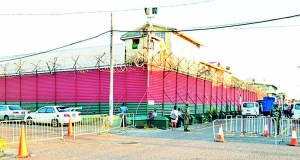Cabinet in discussion to reconstitute Parole Board
The life of the Parole Board having expired in June 2020, Cabinet is currently having discussions on having the Board reconvened to deal with prisoners who have requested early release, according to Home Affairs Minister Robeson Benn.
In a recent interview with Guyana Times however, Benn declined to reveal the number of applications pending before the Board, and confirmed only that persons were paroled this year.
Parole and alternative sentencing are among the key factors in addressing overcrowding in the prisons. After completing the mandatory one-third period of the sentence imposed as prescribed by law, a person becomes eligible for parole consideration.
Subsections (a) and (b) of Section 5(1) of the Parole Act states that the Minister may, if recommended to do so by the Board on a reference made to it by him, release on licence a person serving a sentence of (a) imprisonment, other than imprisonment for life; or (b) detention imposed under section of the Juvenile Offenders Act in respect of any offence of wounding with intent to cause grievous bodily harm.
Once the Parole Board is reconstituted in accordance with Section 3 (1) and (2) of the Parole Act, its members would sit and deliberate on applications made by inmates for early release from prison.

The last Parole Board came into effect on July 01, 2018, and was chaired by retired Justice Oslen Small. It approved the early release of a number of persons who had been convicted of various offences and were serving time.
Relatives of convicted persons seeking early release from prison recently reached out to this publication and bemoaned the slothfulness in having the Board back up and running to serve the overcrowded prison population.
Inmates serving time in various prisons across the country have for far too long been complaining of overcrowding, and have highly criticised the inhumane conditions under which they are forced to live.
To this end, they would post on Facebook videos highlighting their plight, among which is being unable to get a trial within a reasonable time. In fact, several studies done on Guyana’s prisons have found that overcrowding is largely due to a backlog of pretrial detainees.
This current state of affairs puts prisoners at risk of contracting contagious diseases. Just recently, over 200 inmates at the Lusignan prison had tested positive for the deadly coronavirus disease (COVID-19). However, most of them have recovered.
In light of the deadly pandemic, new prisoners are subjected to two weeks in quarantine before being placed with other inmates. They are also examined by medical practitioners for signs and symptoms associated with the virus.
In July 2020, Director of Prisons, Gladwin Samuels, announced that over 350 prisoners were released due to the COVID-19 pandemic, or other reasons which satisfied grounds for early release, such as remission and reduction in bail/self-bail.

These persons were released from the Camp Street Prison in Georgetown; the Mazaruni Prison in Bartica, and the Lusignan Prison on the East Coast of Demerara.
The list of offenders released showed that most of them had been jailed for possession of narcotics, assault, and larceny; while others who were found guilty of more serious offences had served one-third of their sentences.
Like in every sector of the country, the COVID-19 has not spared the justice system.
The presence of the disease has forced the Judiciary to implement new ways to ensure the efficient dispensation of justice, while balancing the health and safety of judicial officers, court staff, prisoners, lawyers, witnesses, and all those who might come into contact with the court system.
Prisoners are seldom being transported to courthouses.
Instead, they are making court appearances virtually via platforms approved by the Judiciary. As far as possible, the courts are using video-links such as Zoom, Skype and Microsoft Team to ensure prisoners attend court.
Recently, the Ministry of Legal Affairs announced that, in an effort to establish the required physical and technical infrastructure for criminal litigation to take place on virtual platforms, retrofitted containers will be installed at the various prisons.
The Ministry explained that the containers will be air-conditioned and equipped with the necessary technical apparatus that would provide a link to the prisoners and the various courthouses. It said that, once implemented, this measure would obviate the need for prisoners to be transported physically out of the prisons and taken to the various courts to have their cases tried.






















